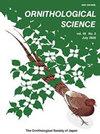鸟类的审美进化可能吗?概念上的注意事项
IF 0.3
4区 生物学
Q4 ORNITHOLOGY
引用次数: 0
摘要
摘要适应性择偶理论被认为为性选择提供了一般性的解释。雌性被认为是基于直接利益选择雄性的,或者是因为它们拥有基于雄性品质视觉指标的可感知的良好基因,包括当前环境中自然选择所产生的适应性品质。然而,最近有人根据达尔文的“真正危险的想法”提出了一个名为“美丽发生了”的假设,该想法受到了批评,用来解释包括人类在内的动物的性选择。因此,它引起了广泛关注,并引发了有争议的辩论。在这里,我回顾了“美丽发生”假说,并澄清了关于女性性自主和审美的争论。我发现,在性二型鸟的情况下,没有明确的证据支持适应性择偶理论。尽管“美丽发生”假说在逻辑上是可行的,但女性的审美观念可能在性自主和资源独立的基础上进化和发展。因此,女性的审美辐射可能会导致男性的审美辐射,而女性的择偶作为一个选择过程,可能独立于自然选择,有利于良好的基因传递,而不是良好的基因。然而,与其他动物类群相比,美丽发生假说似乎更适用于解释两性异形鸟类的行为。我认为,雌性择偶和雄性性内竞争的机制可能会导致生物进化,这取决于不同动物物种中雌性的自主程度。本文章由计算机程序翻译,如有差异,请以英文原文为准。
Is Aesthetic Evolution Possible in Birds? —Conceptual Considerations
Abstract The adaptive mate choice theory is believed to provide a general explanation of sexual selection. Females are thought to choose males based on direct benefits or because they have perceivably good genes based on visual indicators of male quality, involving adaptive qualities acted on by natural selection in the current environment. However, a recent hypothesis, called “Beauty Happens” has been proposed based on Darwin's “Really Dangerous Idea,” an idea that has been criticised, to explain sexual selection in animals, including human beings. Accordingly, it has garnered widespread attention and evoked controversial debate. Here, I review the Beauty Happens hypothesis and clarify the arguments that focus on the sexual autonomy and aesthetic perception of females. I found that, in the case of sexually dimorphic birds, unambiguous evidence is absent in support of the adaptive mate choice theory. Although the Beauty Happens hypothesis is logically feasible, aesthetic perception could possibly evolve and develop on the basis of sexual autonomy and resource-independence in females. Therefore, aesthetic radiation among females may lead to beauty radiation in males, and female mate choice as a selection process may act independently of natural selection, favouring good-to-pass-on genes rather than good genes. However, the Beauty Happens hypothesis seems to be more applicable when explaining the behaviour of sexually dimorphic birds than other animal taxa. I suggest that the mechanisms of female mate choice and intrasexual competition in males may lead to biological evolution, depending on the degree of autonomy of females in different animal species.
求助全文
通过发布文献求助,成功后即可免费获取论文全文。
去求助
来源期刊

Ornithological Science
ORNITHOLOGY-
CiteScore
1.20
自引率
0.00%
发文量
26
审稿时长
>12 weeks
期刊介绍:
Ornithological Science publishes reviews, original articles, short communications and comments covering all aspects of ornithology. Manuscripts are judged on the basis of their contribution of original data and ideas or interpretation. All articles are peer-reviewed by at least two researchers expert in the field of the submitted paper. Manuscript are edited where necessary for clarify and economy. Ornithological Science aims to publish as rapidly as is consistent with the requirements of peer-review and normal publishing constraints.
 求助内容:
求助内容: 应助结果提醒方式:
应助结果提醒方式:


